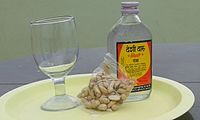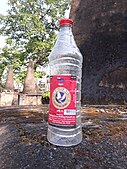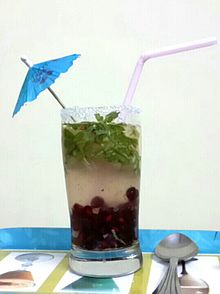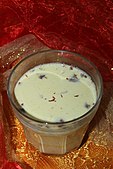List of Indian drinks


With a climate as varied and extreme as India, the people require a myriad of options to keep their thirst appropriately quenched according to the weather conditions, varying from steaming hot drinks during winters to frosty cold drinks in summers. Different regions in the country serve drinks made with an eclectic assortment of ingredients including local spices, flavors and herbs. Available on the streets, as well as on the menus of posh hotels, these drinks add to the flavorful cuisine of India.
Consumption statistics by drink type[]
This is the consumption of drinks per capita per year in India in 2021 by drink type excluding water and juices.[1]
| Drink type | Per capita consumption (liter) |
|---|---|
| Hot drinks | 70 |
| Dairy drinks | 34 |
| Soft drinks | 20 |
| Bottled water | 6 |
| Alcoholic drink | 4 |
| Total | 134 |
Assorted drinks[]
- Aam panna – made from raw mango
- Aamras
- Bael sharbat
- Banta soda, carbonated lemonade sold in codd-neck bottle
- Buransh – made from rhododendron flowers with jelly like consistency, Uttarakhand
- Ela neeru / karikku - tender coconut water
- Fruit juice
- Gaajar ka doodh - made from grated carrot and sweetened milk
- Ganne ka ras or sugarcane juice
- Gud-nimbu sharbat – made of lemon and jaggery
- Jal-jeera
- Jigarthanda, famous in Madurai
- Kahwah is common drink in cold regions of Jammu and Kashmir[2]
- Kala Khatta
- Kanji
- Kesar kasturi
- Khas Khas drink - mad from poppy seeds
- Khus sharbat - made from Vetiver syrup
- Kokum sharbat
- Kulukki sharbat - shaken Lemonade
- Liyo
- Lemonade
- Nannaari (Sarsaparilla) sharbat – lemon-based drink, Tamil Nadu
- Nariyal Pani (Coconut water)
- Neera
- Ookali – hot drink made by boiling coriander seeds, Western India
- Panakam -sweet drink made of jaggery and water with pepper, made on Sree Rama Navami.
- Paneer soda, carbonated lemonade mixed with rose essence and sold in codd-neck bottle is a variation of Banta soda
- Phalsa sharbat – made from Grewia asiatica
- Pudina sharbat – made from mint
- Ramula – a drink made from sweet potato
- Rasna, a soft drink concentrate
- Rooh Afza, a concentrated drink
- Sakar-loung Pani – made from rock sugar and clove; famous in Gujarat, Rajasthan
- Sattu paani – famous in North India
- Saunf paani, from Gujarat
- Sharbat – drink that has many variants
- Shikanjvi - traditional lemonade, often mildly spicy
- Solkadhi
- Sugandha water
- Tnkaw Toraaṇi - a rice based drink from Odisha
Dairy drinks[]
Flavoured milk[]


- – almond-flavoured milk
- Kesar milk – saffron-flavoured milk
- Rose milk - Rose sharbat - flavoured milk
- Sugandha milk
Milk-based beverages[]
- Ambil or Ambli – prepared by using ragi flour and buttermilk, Maharashtra and Karnataka
- Buttermilk – "lassi" in Punjab, chhachh in North India, mor in Tamil, majjiga in Telugu, majjige in Kannada, and taak in Marathi
- Chai with cream – prepared using dry or fresh variants of tea, often has hints of cardamom (elaichi), cinnamon (dalchini) or a mixture of spices, which constitute the special masala chai, taken especially during the cold to keep the winter-related problems at bay
- Haldi doodh or hot turmeric milk
- Lassi – a popular, traditional, yogurt-based drink from Punjab. It is a blend of yogurt, water, spices and sometimes fruit.
- Traditional lassi (a.k.a., "salted lassi", or simply "lassi") is a savoury drink, sometimes flavoured with ground and roasted cumin.
- Sweet lassi, however, contains sugar or fruits, instead of spices.
- Mastaani, Pune
- Sharjah Shake – A sweet, cold beverage made from milk, Horlicks/other malt powders and njalipoovan. Sometimes, ice cream, cocoa powder or nuts may be added.
- Sambaram – Salted buttermilk made from cow's milk spiced with shallot, freen chili pepper, ginger and curry leaves from Kerala
- Thandai
Hot drinks[]
Both tea and coffee contain caffeine and tannin. Comparatiely, coffee has more caffeine and less tannin than tea, whereas tea has more tannin and less caffeine than coffee.
Coffee[]
- Indian filter coffee – a sweet milky coffee made from dark roasted coffee beans (70–80%) and chicory (20–30%)
- Instant coffee
Tea[]
- Assam tea
- Ayurvedic teas, various types of Indian herbal teas
- Temi tea
- Darjeeling tea
- Balma green tea
- Berinag tea
- Black tea
- Green tea
- Seven-colour tea
- Irani chai
- Kangra tea
- Masala chai
- Noon chai
- Nilgiri tea
- Tulsi tea
- Milk tea
Flavoured tea[]
- Butter tea
- Elaichi tea or cardamom tea
- Ginger tea
- Lemon tea
- Tejpatta Tea
Masala chai served with tea biscuits. India's most popular way to drink tea.

A cup of Darjeeling tea.

Butter tea or gur gur in the Ladakhi language, in a bowl; popular in Himalayan regions of India, particularly in Ladakh, Sikkim, and Arunachal Pradesh.
Intoxicating drinks[]
Traditional[]
Cashew apples being squashed in Chorao, Goa, to be used in the preparation of feni.

Desi daru is India's one of cheapest factory made alcoholic drinks.

A bottle of Bangla liquor in Chinsurah, West Bengal, India.
Alphabetised list of native tradition drinks is as follow:
- Akani- palm sap from Tamil Nadu.
- Apo – traditional drink from Arunachal Pradesh made from fermented rice
- Arrack-distilled from a wash of palm Jagger, herbs etc. from Kerala
- Bangla – a distilled country liquor made from starch and sold in West Bengal by government licensed vendors.[3]
- Bhang thandai
- Bhang lassi – prepared from leaves and buds of female cannabis plant
- Bitchi – a drink consumed mostly by Garo tribals
- Chhaang or Tongba – drink from Sikkim made from grain millet
- Cholai
- Chuak – a drink from Tripura made from rice, jackfruit and pineapple
- Desi daru
- Feni – an alcoholic beverage made from cashew apple or coconut in Goa
- Gudamaba – brewed from sugar cane in Hyderabad
- Handia
- Hariya
- Kaid Um – drink in Meghalaya, consumed mostly by Khasi and Jaintia tribes
- Kallu – coconut palm sap from Kerala
- Kodo Ko Jaanr – also known as chyang, prepared from finger millet[4]
- Laopani (also called Haanj) – made from fermented rice in Assam, concentrated extract is called Rohi.
- Lugdi – made from rice, Manali
- Mahua – made from mahua flowers, Central India[5]
- Mandia pej – made from ragi powder and stale water from boiled rice, popular in Odissa
- Manri – made from fermented rice, popular in Mithila
- Rohi – pale yellow coloured extract of Laopani fermented rice drink of Assam, usually offered to the ancestors, priests or elders on special occasions.
- Sekmai – from the state of Manipur; made from sticky rice.
- Sonti
- Sulai
- Sunda Kanji – made from fermenting rice that is buried in earthen or mud pots covered with cloth, sold in Tamil Nadu, India.
- Sura
- Thaati Kallu
- Tharra
- Toddy/Tadi/Kallu (palm wine)
- Urrak
- Zawlaidi – popular in Mizoram prepared from rice, millet and maize.
- Zutho – from Nagaland
Non-Traditional[]
Alphabetised list of non-traditional drinks in India.
- Indian beer
- Indian brandy
- Indian-made foreign liquor
- Indian rum
- Indian vodka
- Indian whisky
- Indian wine
- Lion beer, Asia's first beer brand produced at Kasauli Brewery since 1930, brewery was established by ,[6] father of Colonel Reginald Edward Harry Dyer "The Butcher of Jallianwala Bagh massacre".[6][7][8][9][10][11]
- Old Monk, well-known rum produced since 1954.
- Solan No. 1, India's first single malt whiskey produced at Kasauli Brewery since 1930 which was started by Edward Abraham Dyer.
See also[]
References[]
- ^ India consumption of beverages by type, Statista., accessed 10 July 2021.
- ^ "Kashmiri Kahwa Tea Recipe: How to Make Kashmiri Kahwa Tea". recipes.timesofindia.com. Retrieved 2019-02-13.
- ^ Tathagata Bhattacharya (23 October 2017). "Alcohol and Bengalis: A troubled relationship". National Herald.
- ^ Tamang, Jyoti Prakash (17 August 2009). "8". Himalayan Fermented Foods: Microbiology, Nutrition, and Ethnic Values. CRC Press. p. 198. ISBN 9781420093254. Retrieved 11 August 2015.
- ^ "Some interesting indigenous drinks among the tribals of Central India" (PDF). Indian Journal of Traditional Knowledge. 6 (1): 141–43. January 2007. Retrieved 8 February 2012.
- ^ a b Colvin, Ian Duncan (1929-01-01). The life of General Dyer. Edinburgh; London: W. Blackwood & Sons Ltd. OCLC 1335678.
- ^ Colvin, Ian Duncan (2006-01-01). The Life of General Dyer. Unistar Books.
- ^ Collett, Nigel (2006-10-15). The Butcher of Amritsar: General Reginald Dyer. A&C Black. ISBN 9781852855758.
- ^ Saikia, Arunabh (2016-04-23). "How Old Monk went from India's star to another has-been". Mint on Sunday. Retrieved 2017-01-30.
- ^ "Reginald Edward Dyer 1864-1927 - Ancestry". www.ancestry.com. Retrieved 2017-01-30.
- ^ "Reginald Edward Harry Dyer – The Butcher of Amritsar | Lawrence College Ghora Gali".
- Indian drinks
- Lists of drinks by country
- Indian cuisine-related lists












